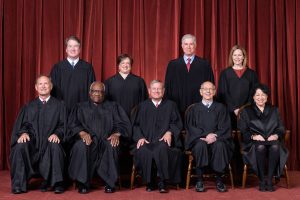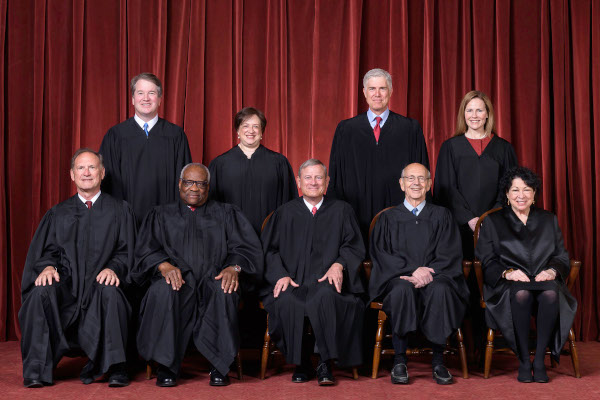 WASHINGTON, D.C. – In an opinion authored by Justice Clarence Thomas, the U.S. Supreme Court held today the Texas age-verification law commonly referred to as H.B. 1181 is properly evaluated under the standard of intermediate scrutiny – and survives that review, as it “has only an incidental effect on protected speech.”
WASHINGTON, D.C. – In an opinion authored by Justice Clarence Thomas, the U.S. Supreme Court held today the Texas age-verification law commonly referred to as H.B. 1181 is properly evaluated under the standard of intermediate scrutiny – and survives that review, as it “has only an incidental effect on protected speech.”
“The First Amendment leaves undisturbed States’ traditional power to prevent minors from accessing speech that is obscene from their perspective,” Thomas wrote. “That power includes the power to require proof of age before an individual can access such speech. It follows that no person – adult or child – has a First Amendment right to access such speech without first submitting proof of age.”
Thomas found the Free Speech Coalition and other petitioners’ “counterarguments are unpersuasive.”
“Petitioners contend that Texas could adopt less restrictive means of protecting children, such as encouraging parents to install content-filtering software on their children’s devices or requiring internet service providers to block adult content unless a household opts in to receiving it,” Thomas wrote. “But, even assuming these approaches are equally or more effective, under intermediate scrutiny a ‘regulation will not be invalid simply because a court concludes that the government’s interest could be adequately served by some less-speech-restrictive alternative.’ Texas’s interest in shielding children from sexual content “‘would be achieved less effectively absent’” H. B. 1181, and it cannot be said that ‘a substantial portion of the burden’ that H. B. 1181 imposes fails ‘to advance [Texas’s] goals.’ That is enough to show that the Texas Legislature adequately tailored H. B. 1181, regardless of whether some other approach might be superior.”
Thomas reasoned that the law “simply requires adults to verify their age before they can access speech that is obscene to children.”
“It is therefore subject only to intermediate scrutiny, which it readily survives,” Thomas wrote. “The statute advances the State’s important interest in shielding children from sexually explicit content. And, it is appropriately tailored because it permits users to verify their ages through the established methods of providing government-issued identification and sharing transactional data. The judgment of the Court of Appeals for the Fifth Circuit is affirmed.”
In the U.S. District Court where the FSC’s challenge was first heard in August 2023, U.S. District Judge David Ezra applied strict scrutiny, a higher standard than intermediate scrutiny, and found the law is both “not narrowly tailored” and “severely underinclusive,” among other constitutional defects. In March of last year, the Fifth Circuit vacated in part the preliminary injunction issued by Ezra, lifting the injunction as to enforcement of the law’s age-verification component, while leaving the injunction in place with respect to the law’s labeling requirements.
In her dissent, Justice Elena Kagan said the majority’s ruling was “confused” and that Judge Ezra had correctly applied strict scrutiny, based on several Supreme Court precedents.
“Cases raising that question have reached this Court on no fewer than four prior occasions – and we have given the same answer, consistent with general free speech principles, each and every time,” Kagan wrote. “Under those principles, we apply strict scrutiny, a highly rigorous but not fatal form of constitutional review, to laws regulating protected speech based on its content. And laws like H. B. 1181 fit that description: They impede adults from viewing a class of speech protected for them (even though not for children) and defined by its content. So, when we have confronted those laws before, we have always asked the strict scrutiny question: Is the law the least restrictive means of achieving a compelling state interest? See ibid. There is no reason to change course.”
Kagan also argued there’s no reason for the Court to subject laws like H.B. 1181 to the lower standard of scrutiny, because if a state truly does its job in narrowly tailoring such laws, the statutes should survive strict scrutiny anyway.
“A law like H. B. 1181 might well pass the strict-scrutiny test, hard as it usually is to do so,” Kagan wrote. “As just noted, everyone agrees that shielding children from exposure to the sexually explicit speech H. B. 1181 targets is a compelling state interest. And Texas might be right in arguing that it has no less restrictive way to achieve that goal: It is difficult, as everyone also agrees, to limit minors’ access to things appearing on the internet. If H. B. 1181 is the best Texas can do – meaning, the means of achieving the State’s objective while restricting adults’ speech rights the least – then the statute should pass First Amendment review.”
Kagan also asserted that the majority’s opinion, “to start with, is at war with itself. “
“Parts suggest that the First Amendment plays no role here – that because Texas’s law works through age verification mandates, the First Amendment is beside the point,” Kagan observed, “But even the majority eventually gives up that ghost. As, really, it must. H. B. 1181’s requirements interfere with – or, in First Amendment jargon, burden –the access adults have to protected speech: Some individuals will forgo that speech because of the need to identify themselves to a website (and maybe, from there, to the world) as a consumer of sexually explicit expression. But still, the majority proposes, that burden demands only intermediate scrutiny because it arises from an “incidental” restriction, given that Texas’s statute uses age verification to prevent minors from viewing the speech. Except that is wrong – nothing like what we have ever understood as an incidental restraint for First Amendment purposes. Texas’s law defines speech by content and tells people entitled to view that speech that they must incur a cost to do so. That is, under our First Amendment law, a direct (not incidental) regulation of speech based on its content – which demands strict scrutiny.”
Attorney Lawrence Walters of FirstAmendment.com told YNOT that in the ruling, the Court “makes the surprising pronouncement that adult access to sexually explicit content is only partially protected, and can be constitutionally restricted by a state requiring age verification before access.”
“The decision labels age verification as an ‘incidental burden’ and therefore constitutionally justified,” Walters noted. “As such, the Court upholds the Texas law under intermediate scrutiny – a standard that was not seriously argued by any party to the case. In the decision, Justice Thomas struggled to distinguish prior Supreme Court precedent that applied strict scrutiny to previous, similar attempts to restrict online access to adult materials. Application of intermediate scrutiny to this type of law is an unfortunate development for the First Amendment, user privacy, and the adult industry.
At the same time, Walters said “the Court did not go as far as Texas wanted, or as far as the Fifth Circuit decided, by upholding the law based on the rational basis test.”
“Some age verification laws may go too far and fail the intermediate scrutiny test set forth by SCOTUS,” Walters added. “Future cases will determine the scope of First Amendment protection of adult access to sexually explicit content under this new test. For now, impacted website operators should consult with their counsel to discuss the implications of the decision on their businesses.”
You can read both the majority opinion and the dissent here.












